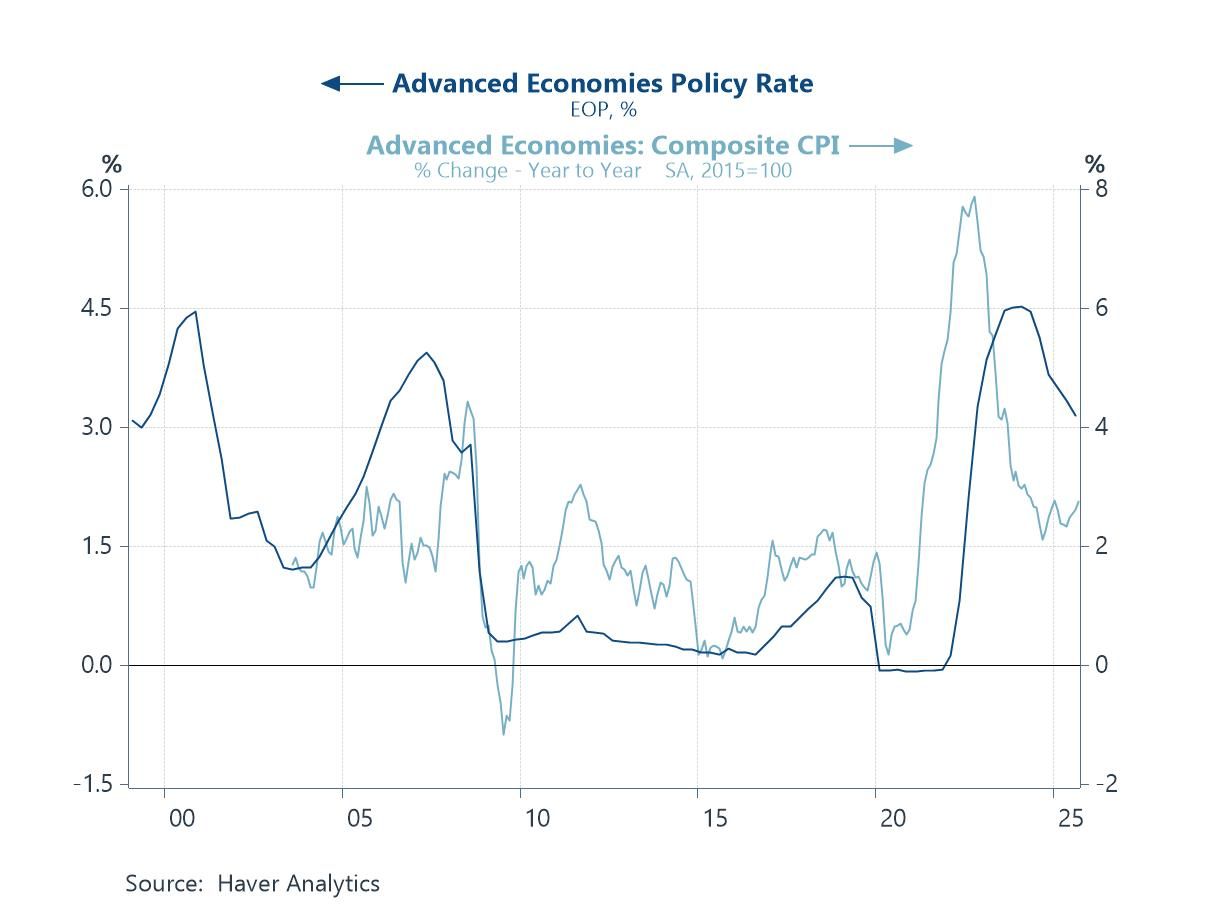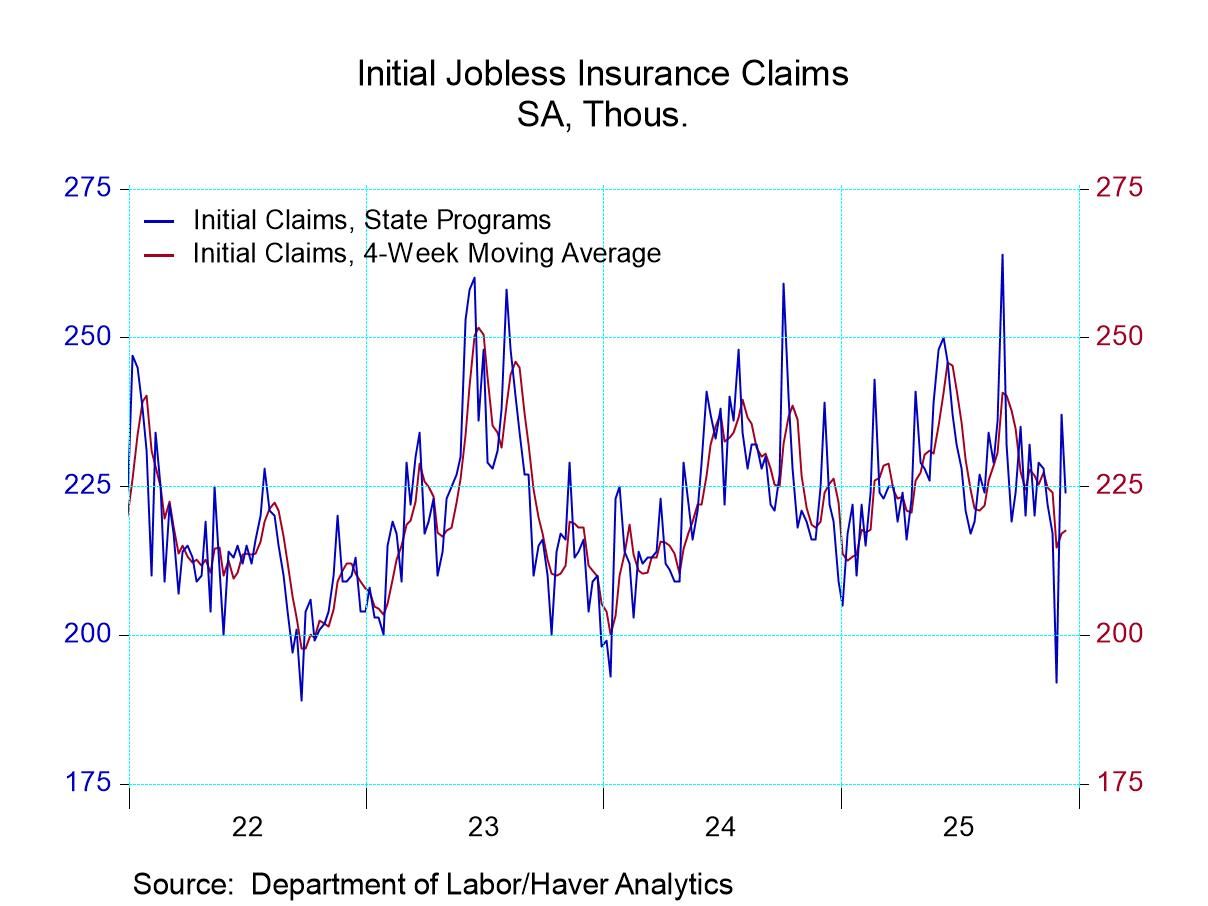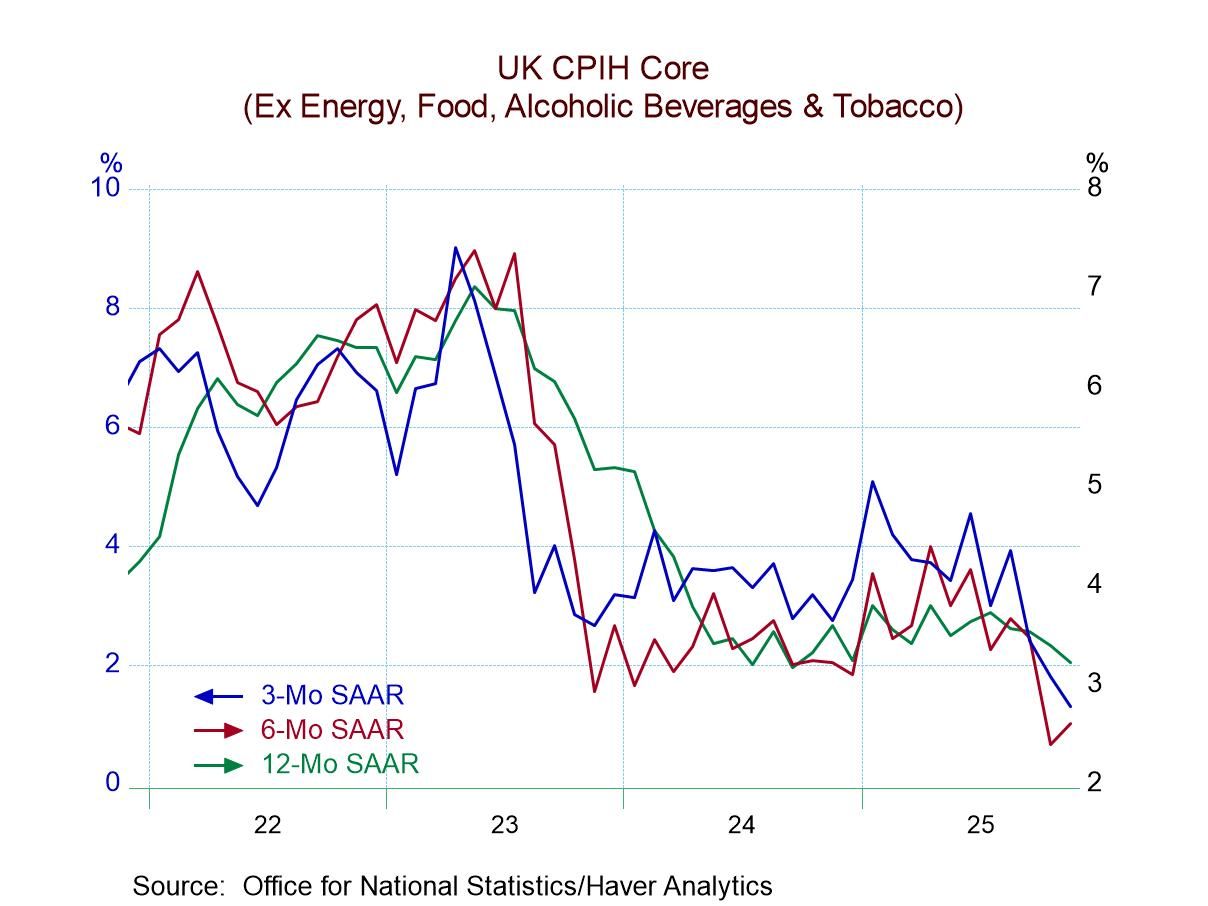 Global| Oct 01 2009
Global| Oct 01 2009U.S. Personal Income Grows Modestly; PCE Raised By "Cash-for-Clunkers"
by:Tom Moeller
|in:Economy in Brief
Summary
Personal income in August continued to increase at its modest July rate. The 0.2% rise followed a 0.2% gain which was revised from 0.1%. Consensus forecasts were for a 0.1% uptick. These weak increases wholly reflect the current [...]
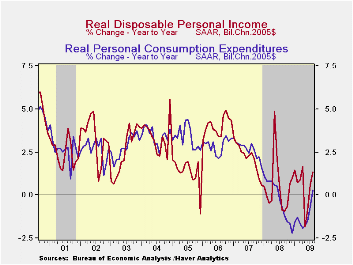 Personal
income in August continued to increase at its modest July
rate. The 0.2% rise followed a 0.2% gain which was revised
from 0.1%. Consensus forecasts were for a 0.1% uptick. These weak
increases wholly reflect the current recession. Year-to-year income
growth fell 2.6% during the last twelve months after a 2.9% increase
last year.
Personal
income in August continued to increase at its modest July
rate. The 0.2% rise followed a 0.2% gain which was revised
from 0.1%. Consensus forecasts were for a 0.1% uptick. These weak
increases wholly reflect the current recession. Year-to-year income
growth fell 2.6% during the last twelve months after a 2.9% increase
last year.
The dismal job market accounts for this year's negative income growth. Wages & salaries rose modestly m/m during July and August. However, these latest gains were not enough to lift wages yr-to-yr which fell 5.2% after a 2.1% 2008 increase. Wages in the factory sector fell 11.6% y/y while service sector wages fell 5.4%. To a limited extent these declines were offset by a 3.6% increase in government sector earnings.
Unemployment insurance payments picked up just some of the slack in the job market and rose 4.4% during August. That lifted payments to $136.9B versus $60.4B during August of last year. Interest income continued to show the effects of lower rates and fell 6.9% y/y while dividend income fell by one-quarter as corporate profits dried up.
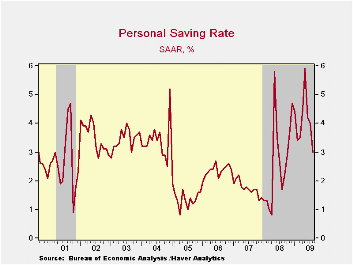 Disposable personal
income increased just 0.1% following a slight decline during
July. Adjusted for inflation, real disposable income slipped for the
third straight month, although only by 0.2% during August and by 0.1%
in July. Real disposable income growth of 1.3% y/y was lifted by tax
cuts earlier this year. The saving rate fell again with the weakness in
income growth. The decline to 3.0% contrasted with a May peak of 5.9%.
Nevertheless, the rate remained up slightly from last year and double
the 2007 level.
Disposable personal
income increased just 0.1% following a slight decline during
July. Adjusted for inflation, real disposable income slipped for the
third straight month, although only by 0.2% during August and by 0.1%
in July. Real disposable income growth of 1.3% y/y was lifted by tax
cuts earlier this year. The saving rate fell again with the weakness in
income growth. The decline to 3.0% contrasted with a May peak of 5.9%.
Nevertheless, the rate remained up slightly from last year and double
the 2007 level.
Personal spending showed the full
effect of the "cash-for-clunkers" program for new motor vehicle
purchases. It lifted durables spending by 5.3% (-1.3% y/y) with a 13.3%
gain (6.6% y/y) for autos. Spending on nondurables rose just 2.3%
(-5.3% y/y) as outlays on apparel continued down by 3.8% versus last
year. Spending on furniture continued quite weak and fell 7.7% versus
last year. 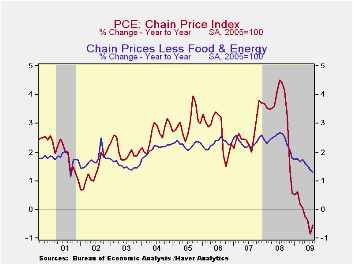 Outlays on services increased 0.4% (1.7% y/y) as spending on
health care continued quite strong and posted a 5.2% gain versus last
year. Spending in restaurants and on recreation remained negative.
Outlays on services increased 0.4% (1.7% y/y) as spending on
health care continued quite strong and posted a 5.2% gain versus last
year. Spending in restaurants and on recreation remained negative.
Prices increased 0.3% during August reflecting an 8.4% rise (-30.5% y/y) in gasoline costs and another rise is in store for September. Nevertheless, the PCE chain price index still was down by 0.5% versus last year. Less food-and-energy, "core" prices were again quite tame and posted their fourth consecutive 0.1% increase. Goods prices rose 0.7% (-3.6% y/y while prices for services increased just 1.0% y/y.
The personal income & consumption figures are available in Haver's USECON and USNA databases.
Yesterday's speech titled Central Bank Exit Policies by Vice Chairman Donald L. Kohn can be found here.
| Disposition of Personal Income (%) | August | July | June | Y/Y | 2008 | 2007 |
|---|---|---|---|---|---|---|
| Personal Income | 0.2 | 0.2 | -1.1 | -2.6 | 2.9 | 5.6 |
| Disposable Personal Income | 0.1 | -0.0 | -1.1 | 0.8 | 3.9 | 4.9 |
| Personal Consumption Expenditures | 1.3 | 0.3 | 0.7 | -0.3 | 3.1 | 5.4 |
| Saving Rate | 3.0 | 4.0 | 4.2 | 1.7 (Aug. '08) | 2.6 | 1.7 |
| PCE Chain Price Index | 0.3 | 0.0 | 0.5 | -0.5 | 3.3 | 2.7 |
| Less food & energy | 0.1 | 0.1 | 0.1 | 1.3 | 2.4 | 2.4 |
Tom Moeller
AuthorMore in Author Profile »Prior to joining Haver Analytics in 2000, Mr. Moeller worked as the Economist at Chancellor Capital Management from 1985 to 1999. There, he developed comprehensive economic forecasts and interpreted economic data for equity and fixed income portfolio managers. Also at Chancellor, Mr. Moeller worked as an equity analyst and was responsible for researching and rating companies in the economically sensitive automobile and housing industries for investment in Chancellor’s equity portfolio. Prior to joining Chancellor, Mr. Moeller was an Economist at Citibank from 1979 to 1984. He also analyzed pricing behavior in the metals industry for the Council on Wage and Price Stability in Washington, D.C. In 1999, Mr. Moeller received the award for most accurate forecast from the Forecasters' Club of New York. From 1990 to 1992 he was President of the New York Association for Business Economists. Mr. Moeller earned an M.B.A. in Finance from Fordham University, where he graduated in 1987. He holds a Bachelor of Arts in Economics from George Washington University.



